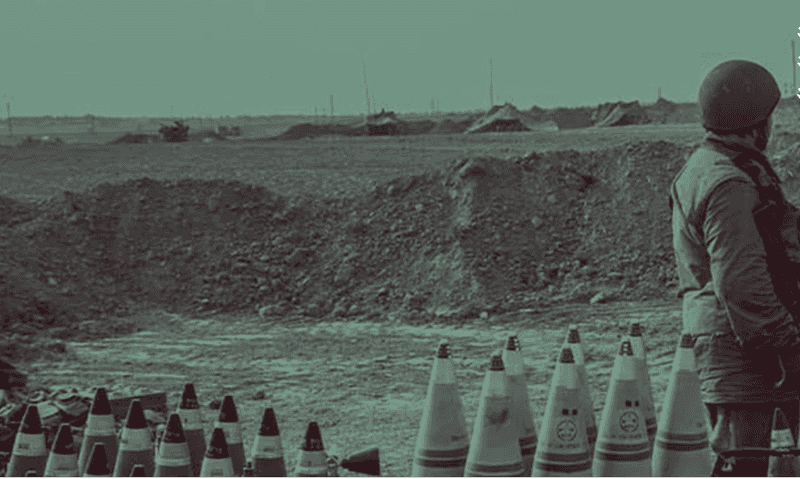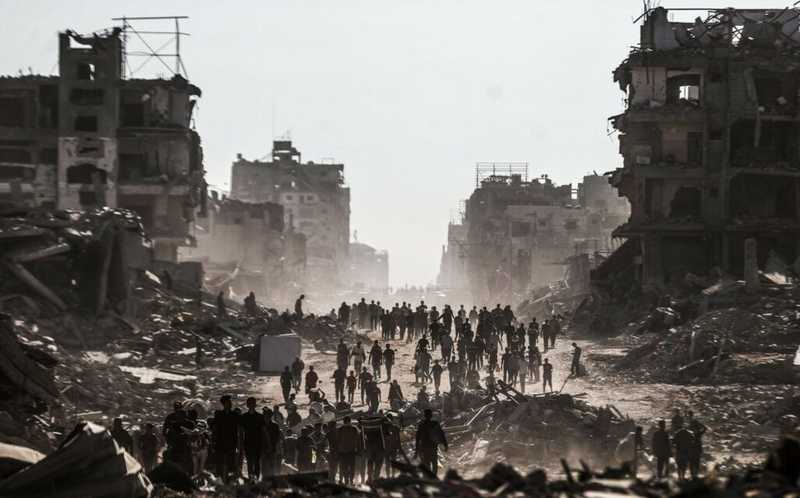
If I must die,
you must live
to tell my story
to sell my things
to buy a piece of cloth
and some strings,
(make it white with a long tail)
so that a child, somewhere in Gaza
while looking heaven in the eye
awaiting his dad who left in a blaze—
and bid no one farewell
not even to his flesh
not even to himself—
sees the kite, my kite you made, flying up above
and thinks for a moment an angel is there
bringing back love
If I must die
let it bring hope
let it be a tale
—Dr. Refaat Alareer
In Gaza, we have evidence of the functioning world system. In Gaza, every man-made cruelty is granted its testing ground, the spirit of elimination made material in the circuitry of quadcopters and phosphorus shell launchers and laser-guided munitions. The architectures of death and dismemberment spare nothing and no one, in Gaza.
We awoke yesterday morning, two blood-soaked months into the bloodless schedule of operations, to word that the Zionist entity and America had rounded up Palestinian men in Beit Lahia, stripped them of their clothes, and abducted them. They add to the tally of the more than 8,700 political prisoners who have been taken from us, each of whose stories comprise a world, each of whom represent the terms of everything worth fighting for. We awoke to the news of thousands clamoring near an UNRWA food hoarding site in Deir al-Balah; to coordinated famine, the engineered product of the Zionist entity’s siege and targeting of food depots and bakeries. We keep waking to news: Palestinian archives, civil service buildings, entire universities made rubble; we awoke to a world without the martyr Dr. Refaat Alareer, whose words open this essay.
The indignities threaten to overwhelm. But for those in solidarity with the Palestinian people, there is no time for despair. We owe it to every martyr to fight, we have obligations, we have made commitments. When everything seems designed to generate resignation, to produce acquiescence, those commitments are life-giving, and can see us through till the end. That end may be abrupt, it might be quiet or hard, but refusal is a sign of our aliveness. When a nihilism beckons that cannot be rejected wholesale, we must ask it to be fleeting, and let the productive work set us on a path to something different.
As with all wars, the home front becomes a site of contestation too. The last two months have been marked by an intensified attempt at repression from Western state forces and Zionist formations, ranging from blatant media disinformation to violent hate crimes against Arabs and Muslims; from the strengthening of surveillance and incarceration to the doubling-down on arms shipments to the Zionist entity. Imperial feminism trotted out its preferred tacticians to place their heels on the necks of the oppressed. The Congressional charlatans and racists quizzed one another about Jewish safety in the same rooms that authorize Palestinian mass death. It’s a sick game for them; speechifying on behalf of a bottomless pit. They want you to believe that you are wrong to demand that the system that extracts your labor, that segregates your cities, and imprisons your loved ones no longer operate as normal, that it cease transferring its surplus to the monopolists choreographing the killing fields in Gaza.
Many have diagnosed this as a collective “psychosis” that has blanketed the West. But it is more appropriate to describe what is occurring as an apocalypse for the settler mythology, its systems of consent and knowledge production now perforated by stone and by rocket. It is more appropriate to describe what we are seeing as coldly calculated, the metabolization of shock and dismay—that the Palestinian “problem” refuses to be contained, that the liberatory spirit of our resistance is unbroken—into punishment and censorship. In its musculature is the strategic marshaling of every bureaucratic system to snap the backs of those who fight. What is psychotic about the current revanchism, then, is neither its psychic core of racism and profit, nor its implementation by state- and para-state power. Instead, the psychosis is ours. It is crazy-making to have to witness horror upon horror—mounting dread, contact lost with friends and family, pangs of sorrow punctuated by rage—and to maintain calm and steady work. We hold this all to be true, and welcome the tensions, for our movements have always been populated by the crazy and the alive.
It is important we remain clear-sighted about what is happening everywhere Palestinians live. The conditions forced upon Gaza defy description. Rafah is still closed, as is the way home. The prisons are bursting at the seams, and our people face unspeakable torture. The Palestinian resistance remains; the Zionist occupation continues to be humiliated on the battlefield. Time and again, the resistance has extracted immense cost on the occupying army that seeks our annihilation. And, try as they might to pummel popular consciousness into submission, Palestine has become undeniable. This is not just a result of moral force, but also, of tactics.
Since we last spoke, 500,000 people marched on Washington. There, parts of the Palestine movement called on organized labor, the student sector, media workers, healthcare workers, and all of civil society to engage in a variety of tactics to disrupt and escalate until ceasefire is achieved and the siege on Gaza ends. Protesters have shut down highways, train stations, and bridges in the United States; in Canada, hundreds of Indigenous activists and rank-and-file trade union members shut down arms factories; some of the largest Belgian and Italian unions are refusing to transport weapons; South Africa, Bolivia, Chile, and Colombia have recalled their ambassadors or cut diplomatic ties; and thousands have protested outside of embassies complicit in the genocide. We have seen organized student walk-outs, sit-ins outside political offices, and direct confrontations with leaders supporting the genocidal violence, which have intensified political contradictions as well as consolidated relationships between organizations and sectors. Labor unions have passed ceasefire resolutions and continued the necessary work of divestment and sanctions. Community groups have popped up in every neighborhood across America. They are animated by Palestine because they are animated by their own struggles: to live a dignified life free of interference from everything that wages war on human dignity. A cop in New York tells a passerby that they are exhausted, that the protests are never-ending, that the cities are hemorrhaging money trying to keep up. We, on the other hand, will not tire. It gets colder and still we march outside; it gets colder in Gaza and still they sleep outside.
The story is unity, just as the story is “not enough.” The story is the will of the popular masses summarily ignored by the ruling class. The story is of Gaza’s people forming a revolutionary north star. And yet, that is not the story you will read in the mainstream. We maintain that the total and complete journalistic malpractice we are witnessing is shocking, even by the standards of dehumanization and lies that have historically marked coverage of Palestine. What is clear is that the Western imperial powers desperately want you to believe that this collective punishment is justified; they want you to hate the Palestinian, from fighter to infant, so that you turn away and shrug. They think you are stupid and they think you are disposable. They have decided their policy or their policy has decided them, but now the mission of the apparatchiks and stenographers is post-hoc justification and self-preservation. The money continues to flow, the bombs continue to rain down, and you either make it their problem or they’ll be coming for you in the morning.
We remain awed by the bravery and steadfastness of our people in Gaza, in Jabalia and Khan Younis and Shuja’iya. The images pile on top of us, threatening to lower our heads, but, instead, we carry that weight. Were we to treat the last Palestinian breath the same as all those that came before, we would be cowed by the totality. We would understand a death to be just as much a collective failing as a life of besiegement and malnutrition and clipped dreams. We would see in a martyrdom the same promise of carrying forward that moves us to careful study and comradeship and prayer while on this earth. And most of all, we would understand who is against life itself, against a Palestinian life which threatens to rearrange the world and end the conveyor belt of theft and dispossession that has marked America’s long century.
This piece originally appeared in the New Inquiry.





